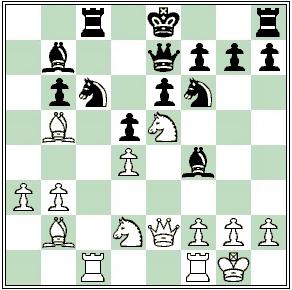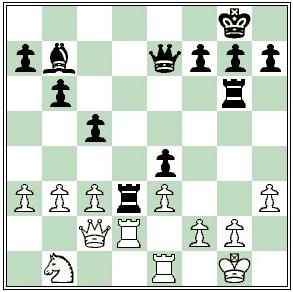Sean previously posted about the centenary of the birth of Thomas Cox, Irish chess champion in 1937 and 1938 but who died in 1939 aged only 27. This present post is the first of a series of articles on important matches played by Cox in 1936, which were the building blocks towards his Irish championships triumphs in the following two years.
The 1936 Leinster Championship was played over the first three months of the year in an all-play-all format and by winning his final game against Casey on the 25th March, Cox secured the Leinster title. At that point he was the youngest ever winner of the championship, which coincidentally had first been contested in the year of his birth. A few days later, there was a small article in the Irish Independent focusing on the young champion.
“Mr. Cox’s success should be an encouragement to all beginners and novices, as he took up the game less than three years ago. Joining the Dublin C.C. in October 1933, Mr. Cox was placed in fifth class and was entitled to receive the odds of Rook and Knight from the top players, at which odds, for a time, he lost more games than he won. With the aid of the excellent club library and the ready help of the club’s strongest players, who are always ready to help and encourage weaker players, he advanced to the 1st class inside twelve months.
For the past two seasons Mr. Cox has played for the Blackrock C.C. in the Armstrong Cup Competition, and this year the club won the trophy for the first time since 1902-3, when the club’s name was “Booterstown C.C.”.
Although he was rapidly improving, Cox still only played Board 3 for Blackrock in the 1935-6 League campaign, with the boards above him occupied by Ralph Varian, the 1928 Leinster champion (on board two) and J.J. O’Hanlon, who at that point of his career had already won seven of his nine Irish championship titles. Over the course of the next half-year Cox and O’Hanlon (who had not competed in the 1936 Leinsters) would face each other in three matches, all of which we will feature in this series of posts.
The first of those matches was a play-off for the Dublin C.C. Championship, which in those days was often as strong an event as the Leinster Championship. The match was played between the 15th and the 25th May and the Irish Independent for the 2nd June, under the heading “The Chess Match of The Season”, reported on the battle between youth and experience:
“The surprise of the chess year so far was the result of the match, which ended last week, for the championship of Dublin C.C. between J.J. O’Hanlon (holder), Irish champion, and T. Cox, the 23-years-old Leinster champion. They had tied for first place with 5 pts. each out of 6 in the championship tourney, and the committee ruled that a five-game match should decide the issue. Mr. O’Hanlon (white) seemed all set to retain the title when he won the first game after 57 moves pf a fine game that lasted 4½ hours, but with commendable pluck Mr. Cox came out to win the next three games in a row, and become the youngest player ever to win the club title since its foundation in 1867.
Game No.2 went 38 moves (3 hrs.); game No.3, 41 moves (4 hrs.); game No.4, 40 moves (3 hrs.) this making the whole match, 176 moves, in 14½ hrs., or an average of 44 moves per game in 3 hrs. 37½ mins. The winner showed resourcefulness and patience in critical positions, and counter-attacked strongly after prolonged sieges in one or two games.”
As far as I am aware, none of the games from this match have found their way into the databases; indeed the two games below have probably not been seen anywhere else since being published in the Independent newspapers at the time of the match.
 Thomas Cox – John J. O’Hanlon
Thomas Cox – John J. O’Hanlon
Dublin Chess Club Championship
Play-off match (Game 2), 16 May 1936
1. d4 d5 2. Nf3 Nf6 3. e3 c5 4. Bd3 e6 5. b3 Nc6 6. a3 cxd4 7. exd4 Qa5+ 8. c3 Bd6 9. O-O Qc7 10. Qe2 b6 11. Bb2 Bb7 12. Nbd2 Rc8 13. c4 Na5 14. Rac1 Qe7 15. c5 Bf4 16. Bb5+ Nc6 17. cxb6 axb6 18. Ne5 (diagram) O’Hanlon is sleep-walking his way to defeat. Here 18…Bxe5 was absolutely necessary to avoid losing material. Now Cox exploits the pinned Knight on c6; 19…Rxc6 would only have lost the exchange, rather than the full piece. 18… Qd6 19. Nxc6 Bxc6 20. Rxc6 Rxc6 21. Rc1 O-O 22. Rxc6 Qb8 23. g3 Bd6 O’Hanlon’s situation is hopeless but he played on until eventually resigning on the 38th move. 1-0 [Click to replay the game.]
 Thomas Cox – John J. O’Hanlon
Thomas Cox – John J. O’Hanlon
Dublin Chess Club Championship
Play-off match (Game 4), 25 May 1936
1. d4 Nf6 2. Nf3 e6 3. e3 c5 4. Bd3 d5 5. b3 Nc6 6. a3 Bd6 7. Bb2 O-O 8. O-O Qe7 9. Nbd2 e5 10. dxe5 Nxe5 11. Nxe5 Bxe5 12. Bxe5 Qxe5 13. Nf3 Qe7 14. h3 b6 15. c3 Bb7 16. Re1 Rfd8 17. Qc2 Ne4 18. Bxe4 dxe4 19. Nd2 Rd3 20. Rad1 Rad8 21. Nb1 R8d6 22. Rd2 Rg6 (diagram) Cox was under pressure here, but he now showed the “resourcefulness and patience in critical positions, and counter-attacked strongly” which the Irish Independent had said was the hallmark of his play during the match. 23. Red1 Qg5 24. g3 Qd5 25. c4 Qc6 26. Nc3 Rh6 27. Nd5 Qe6 28. Rxd3 exd3 29. Qxd3 Rxh3 30. e4 Rh6 31. Nf4 Qe7 32. Qd8+ Qf8 33. f3 Bc6 34. Qc7 g5 35. Rd8 Be8 36. Qc8 Rc6 37. Qb8 Qh6 38. Rxe8+ Kg7 39. Rg8+ Kf6 40. Nd5+ 1-0 [Click to replay the game.]
